The increasing number of refugees in Germany is pushing many municipalities to their limits. In a poll by Report Mainz 17 percent say they are already over the limit. This is also shown by a look at Upper Bavaria.
Akram is from Yemen. His new home in the district of Dachau: a parcel in a former equestrian shop – a cupboard, a bed and a bit of light. His neighbors are about 70 other refugees who have to live close together in small plots, separated by site fences and filing cabinets. Despite the modest living conditions, he is happy to be here. It is much better than in a civil war country.
Actually, all this was only intended as a temporary measure, for a few days. But now so many refugees are coming to the district that District Administrator Stefan Löwl no longer knows what to do with them. “We simply don’t have any more resources for accommodation, at least not adequate ones,” says the CSU politician. And that’s why we need help here.
“Better than in Yemen” – Akram on his bed in the temporary accommodation in the district of Dachau near Munich.
Number of applications increased by 73 percent
District Administrator Löwl’s call for help is not the only one these days. Other municipalities also need more money and more living space. According to the authorities, the number of asylum applications in Germany has increased by more than 73 percent in the past four months compared to the same period last year. Municipalities have to deal with this now.
The ARD magazine report Mainz has asked all 400 independent cities and districts nationwide how high they are burdened. Almost half answered: 69 percent say the influx can just about be managed. 17 percent state that they are already over the limit.
Germany go the refugee helper out of
In addition, there are fewer and fewer volunteers available to the municipalities – including in Dachau: in 2016 there were around 1000 helpers, today there are only 100. The situation here is now so serious that even experienced refugee helpers like Joachim Jacob are sounding the alarm. He has been involved in refugee aid for over ten years and is now chairman of the Bavarian Helpers’ Association.
“Everything that was very important and essential for integration is no longer happening,” says Jacob. The refugees were left to their own devices. “There is a social explosive there that cannot be ignored either.” In a poll by Report Mainz Among 52 so-called helper circles, i.e. associations of volunteers, more than two thirds complain about a decline in volunteer helpers.
The accommodation in a former equestrian shop was supposed to be temporary for a few days.
The crisis becomes a school crisis
And the situation is also getting worse and worse in schools, for example in Schwäbisch Hall. Almost everyone in class 5c has a migration background. Some of them are refugees, and some of them speak little or no German. And class teacher Marco J. still has to teach. Communication here goes with hands and feet.
The problems are no longer only felt in this class. According to the school management, there are now many refugee children at the school, and new ones are constantly being added. Although they would receive language support, they would still take part in the lessons right from the start. And that poses great challenges for teachers. A pedagogue tells us that she can hardly meet this challenge despite the greatest effort, the level of learning is sinking.
This is also shown by a representative survey by the Robert Bosch Foundation. At the end of 2022, 53 percent of school principals stated that they no longer had the capacity to take in more refugees. 72 percent consider the human resources to be insufficient.
“It’s not politics, it is Natural Science”
Schools in need, overwhelmed communities. A country struggles for solutions that are complicated. The refugee summit will also have to decide whether there will be more money for the municipalities.
The district administrator of the Dachau district, Stefan Löwl, appealed to the negotiating partners in Berlin and Chancellor Olaf Scholz: “If our needs are not addressed here, then at some point we will no longer make it down here. That’s not politics, that’s natural science. “

